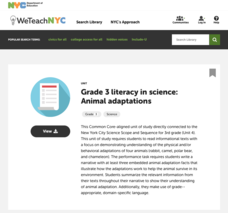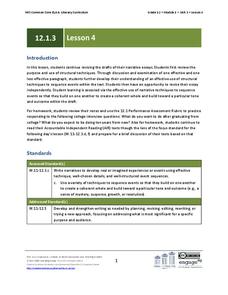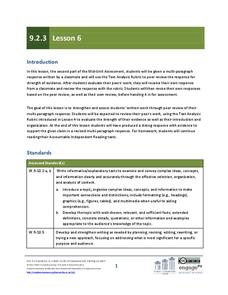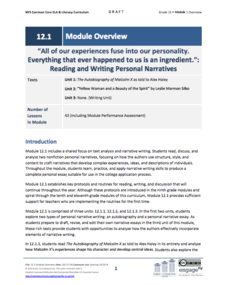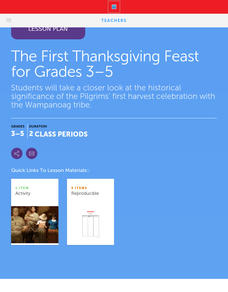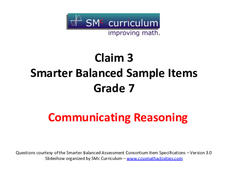EngageNY
Grade 11 ELA Module 2: Unit 1, Lesson 17
Scholars enter the midpoint of the unit and connect all the previous 16 lessons about the text "Of Our Spiritual Strivings." They complete a Mid-Unit Assessment that requires a multi-paragraph response to a writing prompt.
Curated OER
3-D Cell Model
Life science laureates choose a plant or animal cell to construct a model of as an at-home project. This handout provides guidelines, suggested materials, and a grading rubric for their reference. A full-page letter to parents is also...
New York City Department of Education
Grade 3 Literacy in Science: Animal Adaptations
Third graders research and study animal adaptations and then use their findings to write narratives that include scientific criterion. This lesson is all about literacy and science! The lesson is completely designed for addressing Common...
New York City Department of Education
Grade 8 Science: Genetic Modification of Organisms
Genetic modification is a hot topic in the science and political world. A complete unit gives learners an opportunity to research genetic modification, play an interactive genetic engineering simulation, and interact with the information...
Schoolwires
12th Grade Expository Reading and Writing Research Project
The beauty in this resource is the lengthy list of highly charged, controversial-issue research topics. Categories include issues of race, politics, law, environment, education, athletics, gender, and technology. After selecting a topic,...
EngageNY
Grade 12 ELA Module 1, Unit 3, Lesson 4
Once again, class groups examine two model paragraphs and, using the provided rubric, evaluate how effectively the writers use structural techniques to sequence events so that they build a specific tone. Individuals then use what they...
EngageNY
Grade 9 ELA Module 2, Unit 3, Lesson 6
As part of a mid-unit assessment, class members exchange their draft of a multi-paragraph essay with a classmate, review their partner's writing using the provided text analysis rubric, and evaluate the strength of evidence, the...
EngageNY
Grade 10 ELA Module 2: Unit 1, Lesson 20
Readers take all the information they gained from the last 19 lessons and complete an essay describing how King develops his purpose and claim in "Letter from Birmingham Jail." Pupils use a rubric and checklist to help guide their...
Pearson
Practice Test English Language Arts: Grade 7
Practice makes perfect. A practice test designed for the ELA MCAS Assessment gives seventh grade learners the opportunity to answer reading comprehension questions and respond to essay prompts. Questions involve general fiction and...
EngageNY
Grade 9 ELA Module 2, Unit 3, Lesson 5
After rereading the full text of Walter Mosley's essay "True Crime," groups complete an evidence collection tool worksheet, and then class members independently draft a multi-paragraph, evidence-based response that identifies how Mosley...
EngageNY
Grade 12 ELA Module 1
Ah, the dreaded college application essay. Here's a unique approach to crafting a powerful personal essay. Class members read The Autobiography of Malcolm X and Leslie Marmon Silko's Yellow Woman and a Beauty of the Spirit, analyze the...
EngageNY
End of Unit 3 Assessment: Writing a Research Synthesis
Ready, set, write! Scholars work on the end-of-unit assessment by completing a writing prompt. They then look at the model performance task from instructional activity two to create a rubric for scoring the exercise. Using turn and talk,...
Scholastic
The First Thanksgiving Feast for Grades 3-5
Scholars examine the first Thanksgiving through books and interviews while they complete a KWL chart. Pretending they are part of the feast, learners craft a scrapbook page that features images related to their experience. Pupils reflect...
American Physiological Society
Why is Kettle Corn Cooked in Copper Pots?
The kitchen — it's not just for eating anymore! Specific heat is often a difficult concept to grasp, so give it context by relating it to cooking. Learners gain experience in the principles of thermal energy transfer by designing an...
Curated OER
Un Viaje a Mexico
Instructions for a creative Spanish project are outlined in this colorful presentation. This project requires students to work in groups and create their own PowerPoint or poster about planning a trip to Mexico. It includes directions,...
Mathematics Assessment Project
Jane's TV
Jane wants a new television, but she's not sure what size to buy! Your middle schoolers can figure it out when they apply the Pythagorean theorem. Produced especially for meeting Common Core standards in geometry, this activity appeals...
Curated OER
Rubrics Realized
Students create a template document that contains a 6-column/6-row rubric structure. They modify their template to include scoring categories or criteria, and scoring characteristics for a specific assignment.
CCSS Math Activities
Smarter Balanced Sample Items: 8th Grade Math – Claim 3
Communication is the key. A dozen sample items require scholars to communicate their reasoning involved in arriving at a solution. The PowerPoint from the Gr. 8 Claim 2 - 4 Item Slide Shows series uses a variety of content to...
CCSS Math Activities
Smarter Balanced Sample Items: 7th Grade Math – Claim 4
Build the model right out of the box. A few sample items show teachers how Smarter Balanced assessments may approach Claim 4, modeling and data analysis. Pupils use their skills to create equations or expressions to model the situation...
EngageNY
End of Unit Assessment: Writing Best First Draft of “Back Again” Poem
Team up! Scholars begin working with their research teams to review the components of an effective poem. They then move on to independent work by beginning the end-of-unit assessment. Writers complete the draft of their "Back Again"...
EngageNY
End of Unit Assessment: Research Synthesis
Writers near the end of the unit and begin working on the end-of-unit assessment. They analyze the prompt and a model performance task. The class then begins creating a rubric for the assessment by writing bullet points from their think...
CCSS Math Activities
Smarter Balanced Sample Items: 7th Grade Math – Claim 3
Does the explanation make sense? Sample items highlight claim three, communicating reason, in the Smarter Balanced assessments. Teachers use the 16 items to help show pupils the importance of communication and reasoning within...
Michigan Association of Intermediate School Administrators
Persuasive Essay: Grade 5
Improve your fifth graders' persuasive writing skills in four weeks. Working independently, in peer editing groups, and with instruction, writers work over the 17 sessions to craft an argumentative essay. They craft a...
New York City Department of Education
Grade 11 Literacy in Social Studies: Research Paper
The lesson guides young academics through the steps in producing a 10-page research paper on any topic in American history. Historians begin by formulating a thesis and gathering resources, then move on to creating an outline, and end...
Other popular searches
- Grading Rubrics for Poetry
- Peer Grading Rubrics
- Writing Grading Rubrics
- Presentation Grading Rubrics
- Science Grading Rubrics
- Lab Grading Rubrics
- Peer Grading Rubrics Group
- Grading Rubrics Business




